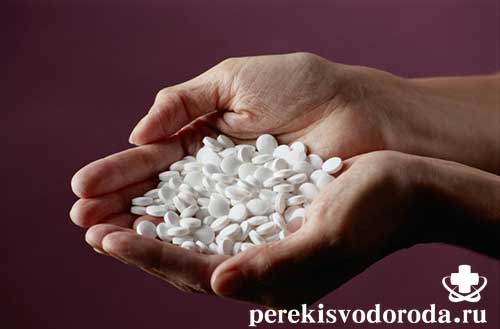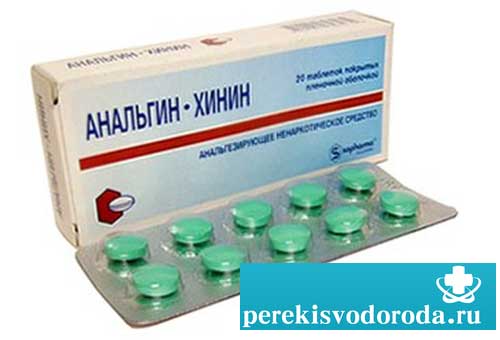Analgin is one of the most effective painkillers. The drug belongs to non-narcotic analgesics, medications that reduce the severity of pain, but do not have an effect on the psyche. What is the drug analgin, what does this remedy help with? Familiarize yourself with the basic information on the drug, find out when it can be used without much harm to the body.
Description
Analgin has an analgesic effect. There are other pharmacological effects - anti-inflammatory, antipyretic. However, Analgin is rarely used to relieve inflammation; in such cases, more effective medications are used.
How long does it take for the drug to help? The effect of the drug appears 30 minutes after its use.
Analgin is intended to relieve pain and fever. It is important to understand that very severe pain can be treated with more effective drugs - narcotic medications.
But still, the most correct decision would be to see a doctor and get examined, and not regularly take analgin. It is important to identify and eliminate the cause of pain.
Does analgin help in treating diseases? Of course, this remedy does not treat hypertension, purulent otitis media, tonsillitis, and does not eliminate many other conditions. The drug helps to get rid of only the unpleasant symptom, but not the cause of the disease.
The medicine is used in cases where quick action is required. The components are easily dissolved and absorbed, which explains the immediate effect that develops as a result of using the drug. A high concentration of the active substance is achieved in the body in a short time. Since the drug has good solubility, parenteral administration is allowed. Analgin and all drugs in which it is present are very popular.
Release form
The most commonly used medicine is in tablet form. The standard dosage of the active substance metamizole sodium in one tablet is 500 mg. Also on sale is a drug containing 50, 100, 150 mg of the active ingredient. The composition additionally contains calcium stearate and potato starch. Auxiliary ingredients include powdered sugar and talc.
Since Analgin is highly soluble in water, it is used in the form of injection solutions (25, 50%). The product is available in ampoules of 1 and 2 ml.
The drug is also available in powder form.
What does analgin really help with?
The drug is mainly prescribed for headaches and other types of pain.
- The medication is effective for pain of various origins and any severity, including analgin that helps with toothache.
- The drug is used for myalgia and neuralgia.
- The drug is used to eliminate postoperative pain and acute pain after injuries. It is used in cases of biliary and hepatic colic.
- Prescribed for the treatment of infectious and inflammatory diseases. In this case, it is used to eliminate pain and reduce body temperature. The drug can be used for influenza, febrile conditions, when there is a sharp increase in temperature. The use of the drug is recommended in the absence of a pronounced antipyretic effect after taking other medications.
- Analgin is prescribed for rheumatism and radiculitis. The drug helps to get rid of pain due to inflammatory processes in the muscles and spasms of the muscles of internal organs.
- The product is effective for pain that accompanies tumor processes.
- In cases where it is not possible to implement other measures, analgin is also prescribed for other intense pain, which manifests itself both acutely and chronically.
How to use

It is not enough to know what analgin in tablets and other forms helps with; it is important to know how to use it. The drug is used intravenously, intramuscularly and for internal use. The optimal dosage is determined taking into account the intensity of pain, fever and the body's reaction to the ingredients included in the medicine.
Analgin-Quinine
Analgin-Quinine tablets are taken after eating, without violating their integrity. Take with sufficient amount of liquid. The recommended single dose for an adult is 0.25-0.5 g of the drug, the frequency of use is 2-3 times a day. For rheumatism, it is allowed to increase the dose of the drug to 1 g with a frequency of use of 3 times a day. Children are administered intravenously 5-10 mg of the drug per kilogram of body weight. It is allowed to use the medicine up to 3-4 times a day.
Injections
If the pain is severe, for adults the drug is injected into the muscles or veins. Injections are given 2-3 times a day using 1-2 ml of solution. The maximum daily dose is 2 g. If a 25% solution is administered to a child, 0.2 to 0.4 ml of the product is taken per 10 kilograms of body weight. When the solution concentration is 50%, its amount is reduced to 0.1-0.2 ml.
Subcutaneous administration is not carried out due to the risk of tissue irritation. The maximum single dose of the drug for internal use by an adult is 1 g, the daily dose is 3 g. For administration into the vein and muscles, a single dosage of 1 g and a daily dose of 2 g are provided.
Tablets for children and the elderly
Children under 14 years of age are prescribed 8-16 mg/kg; if it is necessary to reduce body temperature, 10 mg/kg. For patients over 15 years of age and weighing more than 53 kg, a single dosage of no more than 1 g is prescribed. If the desired effect does not develop, the frequency of taking the drug at the maximum single dose is increased to 4 times a day.
Elderly patients require smaller amounts of the drug, since the elimination of metabolites may occur at a slower rate. In cases where the kidneys do not fully perform their functions, creatinine clearance is impaired, and it is also not recommended to use high doses of the drug. The same recommendations apply to patients with reduced hepatic and renal function. If you plan to use the medication for a short-term period, it is not necessary to reduce the dose.
Do not use the product for a long time. For other patients during long-term therapy, regular blood tests, including white blood cell count, are recommended.
For a child aged 10-14 years with a weight of 32-53 kg, one tablet containing 500 mg of the active substance is prescribed at one time. Do not take more than four tablets per day.
Adults
Patients over 15 years of age with a body weight of at least 53 kg take 1-2 tablets at a time, that is, from 500 to 1000 mg, but not more than eight tablets per day, which corresponds to 4000 mg of the active ingredient.
Contraindications
It is important to know not only what analgin helps with, but also in what cases it is prohibited to use it. The drug is not given to children under 10 years of age, and is not prescribed for the following conditions:
- disorders in the bone marrow and hematopoietic system;
- excessive sensitivity of the body to the components;
- acute intermittent porphyria, accompanied by systolic blood pressure less than 100 mm Hg. Art.;
- pregnancy;
- aspirin asthma;
- intolerance to the components of analgesics and non-steroidal medications that have an anti-inflammatory effect;
- hemolytic anemia of a hereditary nature, which arose against the background of glucose-6-phosphate dehydrogenase deficiency.
Side effects
After prolonged use of Analgin, the likelihood of suppression of hematopoiesis increases. Due to this risk, it is important to regularly check your blood composition.
There are known cases of allergic reactions. When administered intravenously, some patients experience anaphylactic shock.
How does blood pressure change when taking the drug?
Does analgin help in cases where blood pressure is impaired? The drug has an effect on the blood, so many people think that it will help with blood pressure if it increases. In fact, the components of the drug reduce blood pressure, so it is better for hypotensive patients to choose another medication or use Analgin very rarely and in the most minimal quantities.
As for hypertensive patients, the drug is not used as a blood pressure lowering agent. Under the influence of the components of the drug, blood pressure changes insignificantly; a noticeable result is observed only with regular use of analgin. But since regular use of the medication is prohibited, and it is not one of the most effective means designed to solve such a problem, this treatment option is not provided.
For a hangover – is there any effect?
Does the product help cope with the consequences of drinking alcoholic beverages? Analgin helps with hangovers, it eliminates some of the unpleasant symptoms. But it is worth noting that when the drug is combined with alcohol, its negative effect on the kidneys, liver and other organs increases. If there are problems with the kidneys, it is better to choose another drug. To protect your body from intoxication after drinking alcohol, you need to eat protein foods and drink enough liquid in small portions.
How to take for women
During menstruation
Will analgin help with menstruation and should it be used if pain occurs? During menstruation, you can improve your well-being in many ways. Painkillers are used only in cases where a person becomes temporarily unable to work due to severe pain.
Analgin will effectively help with menstruation from the stomach. This is a powerful pain reliever, so it is used in rare cases. The drug helps with abdominal pain, but if used frequently it is harmful to health. During pregnancy, women are prohibited from using this medicine.
For a cold
The medication is an effective remedy for colds. Despite the fact that when using it the cause of the disease itself is not eliminated, the state of health improves. If necessary, the doctor can give an injection of analgin for fever. In addition, the drug helps with sore throat.
Do you use analgin for stomach pain?
If there is discomfort in the abdomen, the question often arises: will analgin help with stomach pain? For inflammatory processes in the gastrointestinal tract, the drug is ineffective, which means it is impossible to get rid of pain through its use. Moreover, the components of the drug can cause some harm to the digestive tract.
For pain in the heart
Does the drug help improve well-being with heart pain? It is known that analgin not only helps with the head, but also eliminates pain in other parts of the body. In cases where discomfort occurs in the heart area, one tablet of analgin is used. The effect of the drug should appear within 15 minutes. Validol, Corvalol or Valocordin are also used.
Interaction with other drugs

Analgin+diphenhydramine
Since drugs can interact with each other, you should always read the instructions carefully. For example, when analgin is combined with diphenhydramine, the effect of the drugs is more pronounced. The mixture is recommended to be taken for fever. This medicinal composition will help reduce the temperature in the presence of inflammation or infection.
It is recommended to combine drugs in cases where a tooth hurts badly or a headache occurs that is not eliminated by other medications. Medicines will also help with hepatic colic and relieve pain from burns and injuries.
If a mixture with diphenhydramine does not help, what to do in such cases? Contact your doctor, he will select other medications or change the dosage of previously prescribed medications.
Diphenhydramine + analgin + papaverine
For fever, analgin and diphenhydramine are used together with the drug papaverine. Does such a triad help to quickly and effectively get rid of fever? It is for this purpose that this combination of drugs is used. When the problem cannot be solved by other methods, the triad helps.
Having learned what analgin helps with, how to use it and in what quantities, you can improve your well-being when the need arises. But do not forget that the drug does not cure diseases. With its help, it is possible to only temporarily mask the symptoms; in the future, examination and treatment are necessary in any case.


